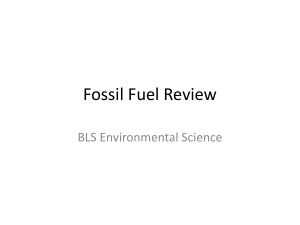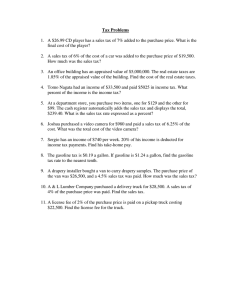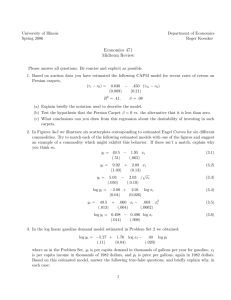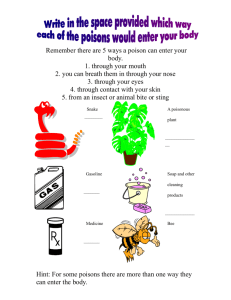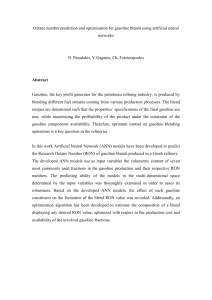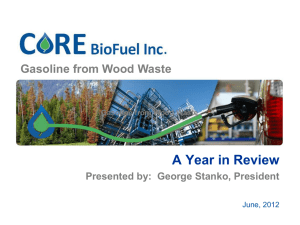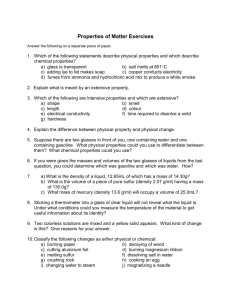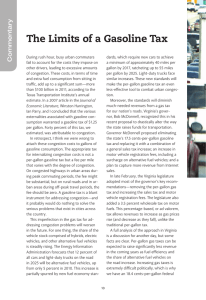Are Gasoline Taxes in Britain Too High? Ian W. H. Parry
advertisement
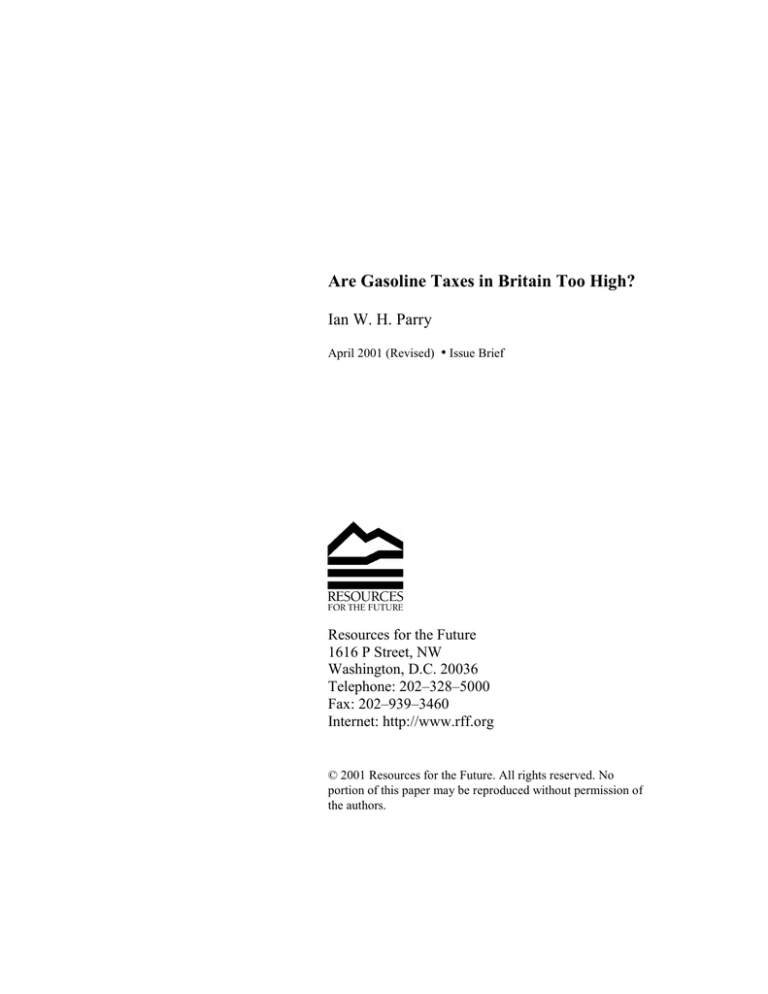
Are Gasoline Taxes in Britain Too High? Ian W. H. Parry April 2001 (Revised) • Issue Brief Resources for the Future 1616 P Street, NW Washington, D.C. 20036 Telephone: 202–328–5000 Fax: 202–939–3460 Internet: http://www.rff.org © 2001 Resources for the Future. All rights reserved. No portion of this paper may be reproduced without permission of the authors. Contents Introduction ............................................................................................................................. 1 The Environmental Costs of Gasoline Combustion ............................................................. 3 Gasoline Taxes and Traffic Congestion ................................................................................ 4 Gasoline Taxes as Part of the Overall Tax System .............................................................. 6 Some Other Arguments for Gasoline Taxation................................................................... 8 Conclusion................................................................................................................................ 9 References .............................................................................................................................. 12 ii Are Gasoline Taxes in Britain Too High? Ian W. H. Parry*, Resources for the Future Introduction Britain witnessed extraordinary scenes in September 2000 as people, particularly truck drivers and farmers, spontaneously took to the streets to protest against high gasoline prices. Throughout the country, oil refineries and depots were blockaded, disrupting the movement of fuel to gas stations. Panic buying by motorists compounded the situation to such an extent that by the middle of the month nearly all of the country’s gas stations had run dry. The protesters were no doubt encouraged by the earlier success of demonstrations in France that led to the government agreeing to tax concessions.1 Similar protests spread across Europe, with truck drivers blockading Brussels, snarling up motorways around Dutch cities, and staging wildcat action in Germany. The immediate cause of the rise in fuel prices is the dramatic increase in the world price of oil, which has jumped from below $10 per barrel in December 1998 to more than $30 per barrel in September 2000 (see Figure 1). The main reason for this price increase is the rapid expansion in the world economy, following recovery from the Asian financial crisis. Consequently, the demand for oil has leapt up, while supply has been restrained, deliberately, by the quarrelsome but at times effective OPEC cartel, and by capacity constraints in non-OPEC countries. However, gasoline prices are also high in Britain because the government now imposes a higher rate of excise tax on gasoline than in any other country. The current excise tax per litre is 50 pence ($2.82 per US gallon), and, even with adjustment for inflation, this tax is 75% higher *Author’s Notes: Correspondence to: Dr. Ian W.H. Parry, Resources for the Future, 1616 P Street NW, Washington, DC 20036. Phone: (202) 328-5151; E-mail: parry@rff.org; Web: www.rff.org/~parry. I am grateful to Dallas Burtraw, Joel Darmstadter, Larry Goulder, Richard Porter, Paul Portney, and Mike Toman for helpful comments and suggestions and to Sarah Cline for helpful research assistance. 1 For the year 2000, the French government agreed to a 30% decrease in fuel taxes for farmers, partial tax refunds for trucking companies, and a 4.5% increase in taxi fares to help pay for fuel costs. Gasoline taxes amount to about 40 pence per litre ($2.60 per gallon) in France, which is the second highest tax rate behind Britain. 1 Resources for the Future Parry than the 1990 level (see Figure 2).2 The tax constitutes 60% of the price of fuel, which now stands at about 83 pence per litre ($4.68 per gallon).3 Gasoline tax rates in other countries are well below those in the United Kingdom (see Figure 3), particularly in the United States where the gasoline tax is about 40 cents per gallon (7 pence per litre). Protest leaders demanded an immediate cut in the gasoline tax to provide some relief for trucking companies, farmers, taxi drivers, and other motorists. In his November 2000 mini budget the Chancellor of the Exchequer, Gordon Brown, responded with a package of measures to reduce road taxes. These measures include a pledge not to increase the gasoline tax in line with inflation in the next budget, a reduction in vehicle taxes for trucks and small engine cars, and a cut of 3 pence in the tax on low sulfur gasoline. But at the moment the government has no plans to substantially reduce the general excise tax on gasoline. The Labour government has defended high gasoline taxes on three grounds. First, taxes reduce pollution and emissions of greenhouse gases by penalizing driving and by encouraging people to purchase more fuel-efficient cars. Second, they also reduce traffic congestion by discouraging driving. Third, gasoline taxes provide revenues that will help pay for the substantial increases in public spending that were recently announced by Gordon Brown. Leaving aside whether these spending increases are justifiable, the issue is: given that the government needs extra revenue, should this funding be financed by raising the gasoline tax above the rate that might be justified on grounds of pollution or congestion, or should the revenue be financed by other means, such as by increasing the personal income tax? The rest of this article discusses what economics has to say about the extent to which government spending should be financed through gasoline taxes versus other taxes, taking into account benefits from reducing pollution and congestion. The focus is purely on economic efficiency; distributional effects and political feasibility also are relevant to the politics of tax reform, but these issues are not addressed here. 2 During the 1990s a fuel tax escalator increased the rate of gasoline taxation each year by 5% above the rate of inflation. This policy had been justified on envirornmental grounds and as a way to reduce the large budget deficit that emerged in the early 1990s. 3 In addition, gasoline is subject to value added tax of 17.5%. However this tax applies to most other goods, and therefore it does not drive up the price of gasoline relative to other goods. 2 Resources for the Future Parry The Environmental Costs of Gasoline Combustion Gasoline combustion causes both local air pollution and emissions of carbon, a greenhouse gas that might affect the future global climate. Local air pollutants include volatile organic compounds, nitrogen oxides, carbon monoxide, and particulates. These emissions can reduce visibility, but their main harm is to human health: for example, poor air quality can exacerbate respiratory problems and cause premature mortality. Economists have attempted to estimate, in monetary terms, the damages caused by these pollutants. This is done by using the epidemiological evidence on the link between air quality and human health, and studies that attempt to assess how much people would be willing to pay to reduce the risk of adverse health effects. Most studies have been done for the United States, although we might expect the results to be broadly similar for other developed countries. Not surprisingly the studies have produced a wide range of possible damage estimates; however, more recent studies point to damage estimates of around 10 pence per litre (60 cents per gallon) or less.4 Economists have also attempted to estimate the potential damage from greenhouse gases such as the damage to agricultural production from climate change, and the cost of protecting valuable coastal regions against a possible rise in the sea level. These estimates are preliminary and subject to much dispute. However, a high damage scenario from the literature would be about $100 per ton of carbon, and this translates into about 5 pence per litre (30 cents per gallon).5 Thus we might, albeit cautiously, put the climate change damages at anywhere between 0 and 4 pence per litre. But reducing gasoline consumption also has economic costs. For example, higher gasoline prices raise transportation costs for businesses and ultimately lead to higher prices for 4 A nice discussion of the empirical literature can be found in Krupnick et al. (1997). In their own study, Krupnick et al. (1997) find that damages amount to about 10 cents per gallon. Another careful study by Small and Kazimi (1995) puts the damages at 63 cents per gallon, although this is for the heavily polluted Los Angeles region. One might expect the damage estimates to be somewhat lower in the United States than in the United Kingdom, given the regulations in the United States that limit emissions per mile from new cars. On the other hand, because income per capita is higher in the United States, people’s willingness to pay to reduce the risk of ill health might be greater. One study that did focus specifically on the United Kingdom (and other European countries) was done by ECMT (1998). They estimated the damages from non-carbon emissions were about 6.5 pence per litre. 5 See Nordhaus (1994) for a careful discussion of the economic impacts of climate change. 3 Resources for the Future Parry goods purchased by households. Also, people will end up driving less, and using other travel options, such as public transportation more than they would prefer to in the absence of high gasoline prices. This change in travel behavior has inconvenience costs. From an economic perspective, the appropriate tax on gasoline to take account of the harm from pollution is equal to the pollution damages per litre (or gallon) of gasoline. That way, the environmental damages are reflected in the price of gasoline, and will be taken into account by motorists and truck drivers as they decide how much gasoline to purchase. This tax would maximize the net economic benefits to societythat is, the benefits from improved air quality minus the economic cost of the burden to drivers. If the tax exceeds pollution damages per litre then, up to a point, the economic gains from cutting the gasoline tax would outweigh the damages from more pollution, and the overall benefits to society would be greater under the reduced gasoline tax. Based on the economic evidence, it seems a gasoline tax of perhaps around 5—10 pence per litre might be justified on environmental grounds, though there is a lot of uncertainty and controversy surrounding the environmental damage estimates. This does not seem to justify the 1990 level of tax in the United Kingdom, let alone increasing it by 75% to 50 pence per litre. In other words, if the government’s objective is to improve environmental quality there are better ways to do this than levying very high gasoline taxes. For example, it could tax coal, which is one of the most polluting commodities produced, or remove regulations on power plants fired by natural gas, a much cleaner fuel. Gasoline Taxes and Traffic Congestion Besides reducing pollution, gasoline taxes are beneficial because they discourage people from driving, and thereby reduce traffic congestion. Their effectiveness at reducing congestion can be rather limited, however. Traffic congestion tends to peak on weekdays during the morning and afternoon rush hours as people drive to work and back home again. Congestion may also be heavier on some routes into town, particularly on more direct roads, than other routes, such as roundabout routes through neighborhood and city streets. There are a variety of ways peak period traffic congestion on major routes could be alleviated by people changing their travel behavior. For example, people could go to the office and leave the office earlier or later, avoiding the rush hour peaks. They could drive along alternative, less-congested routes, or they could car-pool. They could also switch to using public transport, or perhaps walk or cycle. 4 Resources for the Future Parry To reduce congestion effectively requires a policy that encourages people to consider all these alternative travel options. In principle, a congestion tax, that is, a policy that charges people for driving on busy roads at peak periods, does this. A gasoline tax, however, does not take advantage of all the options for reducing peak-period travel. It does encourage people to use public transportation, and it does provide some incentive for car-pooling. But it does not encourage people to modify their work hours to avoid the rush-hour peak, nor does it encourage people to drive on other, less-congested routes into town. Furthermore, a gasoline tax raises the cost of driving on roads that are relatively free flowing, for example, in sparsely populated areas or urban areas at weekends. All this means that the costs of disrupting travel behavior by firms and individuals under a gasoline tax are larger than those under a road-specific, peak-period fee, for a given amount of reduced congestion. In a recent study I found that the overall gains from a gasoline taxthat is, the benefit of reduced congestion less the costs of travel disruptionare likely to be less than one-third of the overall benefits of a peak-period congestion fee (Parry 1999). In short, there are much more effective ways to relieve urban traffic gridlock than by raising gasoline taxes. If other policies are used effectively to deal with congestion, there is no real reason to augment the gasoline tax beyond what is justified from the environmental benefits related to diminished fuel consumption. Nonetheless, peak-road pricing has not been widely implemented in the United Kingdom (nor in other countries) because of political opposition from motorists.6 This means that, for the moment, gasoline taxes might be justified as a “second-best” response to congestion, and it is appropriate to include the congestion benefits in the overall assessment of gasoline taxes. In fact, even though the congestion-reducing effect of gasoline taxes is limited, the economic benefits can still be fairly sizeable, because there is a high cost to people wasting time sitting in traffic 6 It is very hard to start charging people for something they have previously enjoyed for free, even if they may be broadly compensated through other tax cuts. For example, Harrington et al. (2000) found that even when all the revenues from a congestion tax would be returned to people in the form of a cut in income tax, about 50% of people were still opposed to the policy. Similarly, it is almost inconceivable at the moment that a government could start charging people to use the National Health Service or to send their children to comprehensive schools, even if this meant a large reduction in the tax burden. Nonetheless, the political climate for implementing road pricing may be changing a bit. London’s new mayor, Ken Livingstone, has proposed steep fees for driving in the city center. Moreover, recent technological advances, such as the ability to deduct congestion fees electronically from a pre-installed credit card on a vehicle’s windshield, has made time-of-day pricing more feasible. 5 Resources for the Future Parry jams rather working more hours or enjoying more time at home. For example, a study for the United Kingdom by David Newbery (1990) suggests that congestion-related benefits (averaged across urban and rural areas and different times of day) could be as large as about 5 pence (7 cents) per mile. We have to be careful in translating these costs per mile into costs per litre of gasoline because over time only a portion of the reduced gasoline consumption from higher gasoline taxes is due to reduced drivingabout half is due to people switching to more fuel efficient vehicles. Making allowance for this, congestion costs might amount to around 10 pence per litre. In summary, the pollution and congestion arguments seem to point to a gasoline tax of perhaps 15 to 20 pence per litre ($1 to $1.50 per gallon), only about a third of the current UK tax rate. This would still be a very hefty tax thoughabout three times the current US gas tax! Protestors did not have these arguments in mind when they rallied against the current gasoline prices. However fortuitously, the economic analysis to this point supports their goals in indicating that, apparently, the current tax is indeed too high. To complete the picture, however, we must examine the place of the fuel tax in the overall fiscal system. Gasoline Taxes as Part of the Overall Tax System The forgoing considerations indicate that even apart from the government’s need to raise revenue, society can gain a good deal by taxing gasoline, so long as the tax rate is set at an appropriate level to reflect environmental and congestion-related considerations. Of course governments do need to raise revenue. This raises the question of whether the ability to provide revenue constitutes a reason to set higher levels of gasoline taxation than would be warranted on grounds of pollution and congestion. Economic analysis suggests, however, that even when allowing for the government’s need to raise revenue, it seems a stretch to justify a gasoline tax much in excess of 20 pence per litre, based on the damage assessment literature. The reasoning is as follows. All taxes impose costs on society and these consist of two components. First the revenue cost, which is simply the amount of pounds or dollars the private sector gives over to the government. Second, taxes also cause economic costs (sometimes called “excess burdens”) because of their effect on altering the behavior of individuals and firms. Income taxes lead to economic costs because they tend to depress the overall level of employment in the economy. For example, they reduce take-home pay and this may encourage the partner of a working spouse to stay at home rather than look for a job, or an older person to retire earlier. Similarly, because firms must pay social security taxes for their workforce, this 6 Resources for the Future Parry raises the cost of hiring workers, and may reduce the overall number of workers firms are willing to employ. As already mentioned, however, gasoline taxes also produce economic costs by penalizing driving. In fact these taxes may also exacerbate the cost of other taxes. For instance, to the extent that high transportation costs depress the overall level of economic activity, they will push the overall level of employment down even further below levels that would maximize economic efficiency. Leaving aside pollution and congestion considerations, whether it is better to raise extra revenues from gasoline taxes or income taxes depends on whether the economic cost of higher gasoline taxes is larger or smaller than the cost of raising the same amount of extra revenue through higher income taxes. Economists usually find that the costs of specific taxes on individual commodities tend to be greater than the costs of taxes that have a much broader coverage, such as taxes on all labor income in the economy. The economic cost of a tax tends to be larger when there are more possibilities for firms and workers to avoid paying the tax by altering their behavior. A tax on all labor income is relatively hard to avoidthe only way to avoid it is for people to work fewer hours or stop working all together. In contrast, a tax on take-away pizzas would be relatively easy to avoid. People could cook pizzas at home, go to pizza restaurants more often, or order more Indian and Chinese take-away. Put another way, the government cannot raise large amounts of revenue from a tax that can easily be avoided. Similarly, if a gasoline tax were relatively easy to avoid, the economic costs of raising a given amount of revenue from the tax would exceed the costs of raising the same amount of revenue from increasing labor income taxes. If this were the case, the appropriate gasoline tax would be somewhat less than that justified on pollution or congestion grounds. Indeed, if there were no pollution or congestion benefits, from an economic perspective it would be better to raise all revenues from income taxes and none from gasoline taxes! An economic (rather than an environmental) case can be made for some taxation of individual commodities as part of an overall tax system under special circumstances. Roughly speaking, this occurs when the demand for the commodity is not very sensitive to higher taxes, and significant amounts of revenue can be raised without greatly reducing consumption of the commodity. This might to be the case for gasoline, because for many trips going by car is the 7 Resources for the Future Parry only practical option, although the demand for gasoline is more sensitive to price over time as people can switch to more fuel-efficient vehicles.7 The discussion above suggests that the economically appropriate gasoline tax could possibly be a bit higher than the 15-20 pence per litre that might be justified on environmental/congestion grounds.8 But my own research suggests that a tax of 50 pence per litre probably cannot be justified on economic grounds. I find that there would be a net cost to slightly raising the gasoline tax above 50 pence per litre, and that this cost would be two or three times the cost of raising the same amount of extra revenue from higher personal income taxes, even when pollution/congestion benefits are taken into account.9 This then implies that it would be economically efficient to shift some of the tax burden off gasoline and onto income, lowering the gasoline tax well below 50 pence per litre. Some Other Arguments for Gasoline Taxation A couple of other arguments for gasoline taxation are worth mentioning. Some level of fuel taxation might be justified on the grounds that it is a charge to cover the costs of repairing and improving the road system. In the United Kingdom, highway expenditures amount to about 7 For a discussion of the evidence on the sensitivity of gasoline consumption with respect to price, see for example Sterner and Dahl (1991). The less sensitive gasoline demand is to price, the stronger the case for including a gasoline tax as part of the overall tax system, but at the same time it undermines the case for gasoline taxes on pollution and congestion grounds. If higher taxes do not have that much effect on gasoline consumption and driving, they will not have much effect on reducing pollution and congestion 8 To see this, suppose that the gasoline tax were set equal to the level justified by pollution and congestion benefits, say 20 pence per litre. For a small increase in the gasoline tax beyond this level the additional pollution/congestion benefits would roughly offset the costs of the additional disruption to travel behavior. Also, the adverse employment effects of the higher gasoline tax would be a bit smaller than the adverse employment effects of financing the same amount of extra revenue through higher labor income taxes, if gasoline demand is indeed not very sensitive to price. In this scenario then, even though there are overall costs to raising the gasoline tax a bit above 20 pence, these costs would be lower than the costs of raising the income tax. 9 See Parry (2000). This analysis considers scenarios when gasoline is relatively insensitive to price, and in turn this means that the employment cost of raising additional revenue from the gasoline tax is smaller than the employment cost of raising more revenue from labor income taxes. However, this cost is more than offset by the economic costs of additional travel disruption, which swamp the pollution/congestion benefits, at gasoline tax rates of around 50 pence per litre. 8 Resources for the Future Parry 20% of fuel tax revenues. However, this is more an argument for levying specific taxes on trucks (such as a tax on axle weight or a tax on diesel fuel) rather than higher gasoline taxes, because road damage is primarily caused by trucks rather than cars.10 High gasoline taxes are also likely to reduce the number of traffic accidents to the extent that they reduce the average number of cars on the road, and the likelihood of vehicle collisions, and this might raise the level of justifiable gasoline tax somewhat. But there are a couple of caveats to bear in mind. First, a lot of the costs of traffic accidents may already be taken into account by drivers. For example, people should take into account the risk to themselves of injuries when deciding how much to drive. Some costs are not taken into account though, such as the risk of injury to pedestrians. Second, even though gasoline taxes may depress the total number of traffic accidents, they may have less impact on the total cost of accidents. This is because, if there are fewer cars on the road people may drive faster, in which case accidents are more deadly.11 Conclusion This article has discussed the economic case for raising revenue from gasoline taxes as opposed to raising revenue from ordinary income taxes, allowing for the beneficial effect of gasoline taxes on reducing pollution and traffic congestion. Some level of gasoline taxation is appropriate because of the beneficial effects of reducing pollution and traffic congestion, perhaps in the order of around 20 pence per litre ($1.30 per gallon). But it seems likely that the current tax of 50 pence per litre is excessive from an economic perspective. A tax reform that shifts some of the burden off gasoline and onto general income taxation might produce substantial economic benefits. Indeed the environment could be improved if some of the revenues were made up by levying taxes on pollution from all sources (e.g. electricity production) rather than just transportation. 10 Road damage from a vehicle depends on the cube of the axle weight. This means that a truck weighing ten times as much as a car will do one thousand times the road damage. 11 Gasoline taxes may have some other beneficial effects, such as reducing the incidence of oil spills and pollution of groundwater, but these considerations are probably less important than the pollution and congestion benefits. For a thorough discussion of the impacts of gasoline taxes see Porter (1999). 9 Resources for the Future Parry The protestors would be less enthusiastic about a cut in gasoline tax if they thought they would have to pay higher income taxes to finance it. Still, we have suggested that on balance such a tax shift would make people better off. Moreover, the typical protestor is a relatively heavy purchaser of fuelfor example truck driversand therefore would benefit disproportionately from a fuel tax cut. Of course the Blair government might do itself political damage by breaking its pledge not to raise income taxes, to finance a reverse in the recent gasoline tax hikes. Another unpalatable alternative for the government would be to finance a tax cut through a scaling back of its plans to expand pubic expenditure. Whether this is appropriate from an economic perspective depends on the value society attaches to the additional public spending, which is a complex issue beyond the scope of this discussion. The third financing option is simply to budget for a smaller government surplus, although this means that the national debt, and the taxes necessary to pay interest on the debt, will be somewhat higher in future years. But if the government were to cut gasoline taxes, the evidence suggests that the economy as a whole will benefit, even if it means higher taxes elsewhere. In the longer term, the British government needs to reconsider the pollution and congestion argument for high gasoline taxes, and to reassess the appropriateness of gasoline taxation as a general revenue-raising measure. Nominal dollars per barrel 35 30 25 20 15 10 5 0 1991 1993 1995 1997 1999 Year Figure 1. Refiner Acquisition Cost of Imported Crude Oil Sources: Gasolineeum Marketing Monthly, September 2000, Energy Information Administration, U.S. Department of Energy. 10 Resources for the Future Parry 60 pence per litre 50 40 real rate 30 20 nominal rate 10 0 1973 1978 1983 1988 1993 1998 Year Figure 2. Petrol Duty (pence per litre) Gasoline Tax (cents/US gallon) Sources: Institute of Fiscal Studies, International Financial Statistics Yearbook. The real tax series is expressed in 1999 pounds. 300 250 200 150 UK France Germany Italy Japan Spain Australia New Zealand Canada USA 100 50 0 Figure 3. Gasoline Excise Taxes in Different Countries Source: International Energy Association, Energy Prices and Taxes, First Quarter 2000. 11 Resources for the Future Parry References ECMT, 1998. Efficient Transport for Europe: Policies for Internalization of External Costs. European Conference of Ministers of Transport, Organization for Economic Cooperation and Development, Paris. Harrington, W., A.J. Krupnick and A. Alberini, 2000. “Overcoming Public Aversion to Congestion Pricing.” Transportation Research Part A, forthcoming. Krupnick, A.J, R.D. Rowe and C.M. Lang, 1997. “Transportation and Air Pollution: The Environmental Damages.” In D.L. Greene, D.W. Jones and M.A. Delucchi, The Full Costs and Benefits of Transportation: Contributions: Contributions to Theory, Method, and Measurement. Springer, New York. Newbery, D.M., 1990. “Pricing and Congestion: Economic Principles Relevant to Pricing Roads.” Oxford Review of Economic Policy 6: 22-38. Nordhaus, W.D., 1994. Managing the Global Commons: the Economics of Climate Change, Cambridge, MA: MIT Press. Parry, I.W.H., 1999. “Comparing the Efficiency of Alternative Policies for Reducing Traffic Congestion.” Journal of Public Economics, forthcoming. Parry, I.W.H., 2000. “Comparing the Marginal Excess Burden of Labor, Gasoline, Cigarette and Alcohol Taxes.” Discussion Paper # 00-33, Resources for the Future, Washington, DC Porter, Richard C., 1999. Economics at the Wheel: The Costs of Cars and Drivers. Academic Press, San Diego, CA. Small, K.A. and C. Kazimi, 1995. “On the Costs of Air Pollution from Motor Vehicles.” Journal of Transport Economics and Policy 29: 7-32. Sterner, D. and C. Dahl, 1991. “A Survey of Econometric Gasoline Demand Elasticities.” International Journal of Energy Systems 11: 53-76. 12
